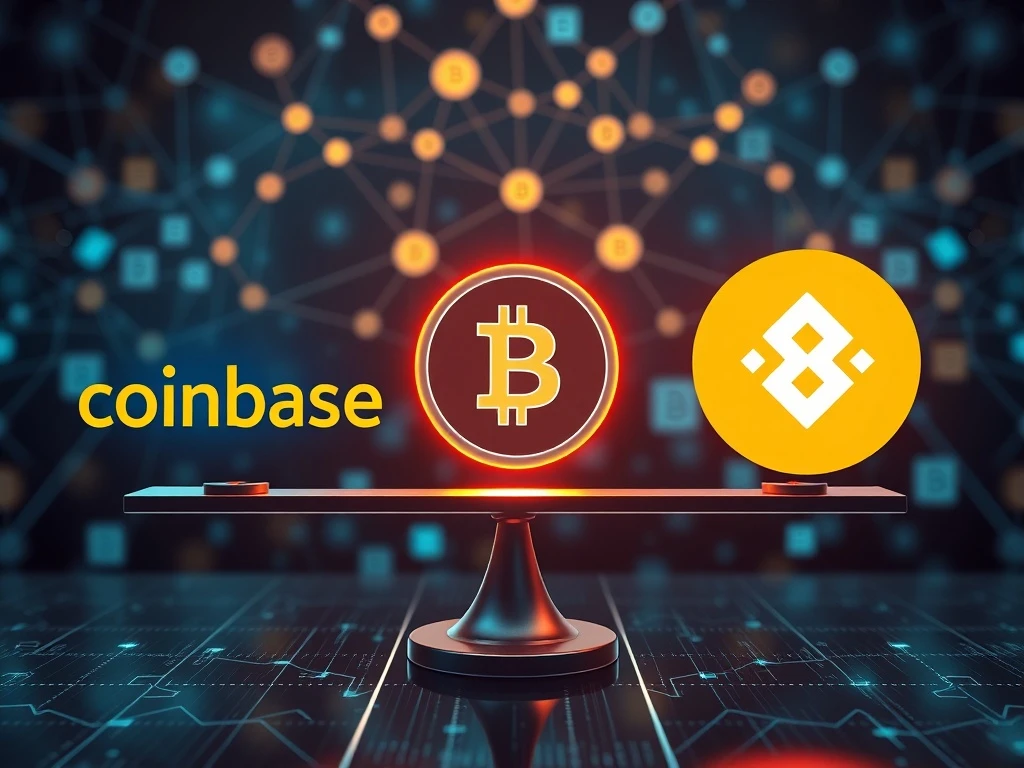Crucial BNB Coinbase Listing Sparks Debate on Crypto Exchange Transparency

The cryptocurrency world recently witnessed a significant development: the BNB Coinbase listing. Coinbase, a leading cryptocurrency exchange, added Binance’s native token, BNB, to its roadmap for planned additions. This decision followed a heated online debate concerning the rules and fairness of crypto exchange listings. This event highlights the ongoing evolution of listing practices and the increasing demand for greater transparency within the industry.
The Unfolding Debate Behind the BNB Coinbase Listing
The conversation began when Limitless Labs CEO CJ Hetherington posted on X (formerly Twitter). He contrasted what he claimed were the differing requirements for token listings on Binance versus Coinbase. Hetherington suggested Binance demanded a substantial 2 million BNB security deposit for a spot listing. Conversely, he noted Coinbase’s requirements centered on “build[ing] something meaningful on Base.” This assertion ignited a widespread online discussion.
Jesse Pollak, Coinbase’s head of Base, further fueled the debate. He publicly stated, “it should cost 0% to be listed on an exchange.” His comment underscored a growing sentiment against perceived listing fees. Initially, Binance responded forcefully. The exchange issued a now-deleted X post, threatening legal action against Hetherington. Binance labeled his claims as “false and defamatory,” insisting it accepted no fees for token listings. However, Binance later retracted its aggressive stance. The exchange issued a follow-up apology, acknowledging its communication was “excessive.” This apology underscored the sensitivity surrounding listing practices.
Whether directly influenced by this social media discourse or not, Coinbase moved swiftly. The exchange added Binance Coin (BNB) to its official listing roadmap. This indicated an intent to list the token on its platform. Former Binance CEO Changpeng “CZ” Zhao publicly praised this development. He also encouraged Coinbase to “list more BNB Chain projects,” highlighting his continued interest in the ecosystem’s growth. CZ remains Binance’s largest shareholder. He reportedly controlled 64% of BNB’s circulating supply as of June 2024, approximately 94 million tokens. This influence demonstrates his ongoing impact on the market.
Examining Crypto Exchange Listings and Fee Controversies
The debate surrounding the BNB Coinbase listing brought crucial questions about crypto exchange listings into focus. Traders understand the immense value of a top-tier exchange listing. Such events often cause immediate price surges or foster gradual adoption. Therefore, the fairness and transparency of these processes are paramount. Hetherington’s initial claims, although disputed, resonated with many in the community. They reflected a persistent concern about potential hidden costs or preferential treatment in listing decisions. Binance’s strong denial of accepting listing fees aimed to clarify its position. However, the initial threat of legal action complicated the narrative. The subsequent apology, nevertheless, sought to rebuild trust and emphasize the exchange’s commitment to fair practices. This ongoing discussion shapes industry standards.
The core of the controversy often revolves around perceived gatekeeping. Critics argue that listing fees could favor larger, wealthier projects. This practice potentially stifles innovation from smaller, yet promising, ventures. Proponents of a “0% cost” model advocate for merit-based selections. They believe this approach fosters a more equitable and competitive environment. Ultimately, the market benefits from diverse and innovative projects gaining visibility. Exchanges, therefore, face pressure to demonstrate impartiality. Their listing criteria must remain clear and accessible to all legitimate projects. This ensures healthy market development.
Driving Greater Transparency in the Coinbase Listing Process
The recent events underscore a broader industry trend. Both Coinbase and Binance are actively implementing changes to their token listing processes. The rapidly increasing number of cryptocurrencies necessitates these adjustments. In March, Binance introduced a community co-governance structure. This innovative model allows users to vote on token listings or delistings. This move directly addresses previous concerns about centralization. It also promotes greater community involvement. CZ himself acknowledged issues with Binance’s prior system. He posted on X that the process was “a bit broken.” He cited the significant time lag between announcing a new token and its actual listing. This admission highlighted internal recognition of the need for improvement.
Coinbase CEO Brian Armstrong voiced similar sentiments in January. He stated the company needed to rethink its listing process. Armstrong highlighted the overwhelming volume, noting “about 1 million tokens a week being created now, and growing.” This surge presents a considerable challenge for any exchange aiming to maintain quality and security standards. In response, Coinbase released a comprehensive guide in September. This guide emphasized that every token application is “free and merit-based.” The process includes a thorough business evaluation and a stringent legal review. These steps aim to ensure integrity and fairness in the Coinbase listing process. This commitment to transparency benefits all market participants.
The Future of Binance Coin and Listing Standards
The addition of BNB to Coinbase’s roadmap is a significant event. It could expand the reach and liquidity of Binance Coin. BNB holds a prominent position in the crypto market. It was the third-largest cryptocurrency by market capitalization, approximately $160 billion, at the time of this article’s publication. Data from Nansen indicated the BNB price was $1,149 at that time. This substantial valuation underscores its importance within the digital asset landscape. CZ’s continued advocacy for BNB Chain projects further highlights the ecosystem’s potential. His influence, even from a non-operational role, remains considerable. Therefore, his calls for broader adoption carry weight.
The ongoing dialogue about listing standards reflects a maturing industry. Exchanges are moving towards more structured and transparent frameworks. This evolution benefits both projects and investors. Binance’s community co-governance model represents a step towards decentralization in decision-making. Similarly, Coinbase’s emphasis on free, merit-based applications fosters trust. These changes ultimately enhance Binance transparency and overall market integrity. As the crypto space continues its rapid expansion, clear, equitable, and transparent listing processes will become even more critical for sustainable growth and innovation across all crypto exchange listings.









